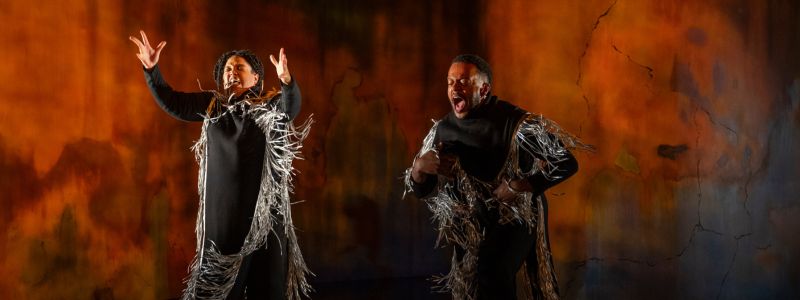Poetry Activity

This activity puts the poetry of contemporary Black women poets in conversation with that of Sophocles’s Antigone by inviting participants to create their own blackout poems, also called redacted poems.
Sophocles lived through both the Persian and Peloponnesian wars. Though known as a tragedian, he was fundamentally a poet. With this in mind, Director Gabrielle Randle-Bent consulted with the modern counterparts of ancient wartime poets: Black women poets in Chicago. Court’s production brings this classic text into sharp focus in our modern times, poignantly honoring the past while speaking to the present of our cultural documentarians.
Though created for learners of any age and adaptable to both individuals and groups, this activity can be easily implemented in a classroom setting.
The Poetry of Antigone, The Poetry of Black Women
- Activity Preparation
- Supplies
- Printed copies of the poems of Antigone (if these poems are being used for a group, print several of each so participants can select their preferred poem)
- Dark-colored markers (one per person)
- Internet access
- Set-Up
- If conducting the activity with a group, set out stacks of each of the six poems.
- Supplies
This activity will take approximately 65 minutes.
- Learning Sequence
- Take a moment to skim the poems from Antigone. Select one of the poems. You may choose your poem based on the title alone, or you can select one that is most interesting to you. While most of the poems are approximately the same length, the first (the light of a traitor) is longer, and the last (the grieving sea) is shorter than the rest. For reference, the poems are titled as follows: (~4 minutes)
- the light of a traitor
- men’s work
- time out of mind
- smiles as she kills
- fate moves on
- the grieving sea
- Read through your selected poem twice. Make a note of the tone of the poem. Each poem is spoken by the chorus—in Court’s production, the chorus is comprised of the poets Demophilus and Euboule—but each appears at varying moments of tension. (~8 minutes)
- Using a dark marker, cross out partial or total lines from the original text of your selected poem. You may choose to cross out several lines in a row; perhaps you only leave a few select words or phrases visible. You may prefer to scan the text, mark words and phrases you find interesting, and then cross out the remaining text. The text that remains is your new blackout poem! If you would like a more in-depth explanation of how to make a blackout poem, check out this video. (~13 minutes)
- Read through your brand-new blackout poem, paying attention to the tone. Note whether the tone of your new poem reflects, amplifies, or contrasts with the tone of the source text. (~3 minutes)
- Explore the work of four Chicago poets who spoke with Director Gabrielle Randle-Bent and Dramaturg Ahbi Shrestha prior to rehearsals. The below links direct you to the biographies of these poets; their available work is linked on these web pages (or linked separately). (~15 minutes)
- Pick a poem by these writers that interests you. As you read through your selected poem, note the tone and any words, phrases, or lines that resonate with you. Ask yourself: How does this poem speak to the poem you selected from Antigone? How does this poem speak to your redacted poem? Select what you find to be the most striking pieces of your newly-selected poem. Then, locate places in your blackout poem to fuse these new words, phrases, and lines. You may place them anywhere, break them up if you please, or repeat them multiple times. Let your creativity flow! (~15 minutes)
- Examine your final poem—once ancient, then redacted, and now revamped. Reflect on your new text and its previous versions with the following questions, or discuss them if working with a group: (~7 minutes)
- How does the tone compare between Sophocles’s original poem and the one you chose from a Chicago poet?
- How has the tone shifted in each new iteration? How has the meaning changed?
- What role does poetry play in documenting the darkest parts of human history?
- In what ways do Black women poets in today’s world echo or parallel the efforts of Sophocles as a wartime poet?
- Take a moment to skim the poems from Antigone. Select one of the poems. You may choose your poem based on the title alone, or you can select one that is most interesting to you. While most of the poems are approximately the same length, the first (the light of a traitor) is longer, and the last (the grieving sea) is shorter than the rest. For reference, the poems are titled as follows: (~4 minutes)
- This activity addresses the following standards:
- Illinois Arts Learning Standards
- Anchor Standard 1: Generate and conceptualize artistic ideas and work.
- Anchor Standard 2: Organize and develop artistic ideas and work.
- Anchor Standard 4: Select, analyze, and interpret artistic work for presentation.
- Common Core State Standards
- CCSS.ELA.R1 Read closely to determine what the text says explicitly and to make logical inferences from it; cite specific textual evidence when writing or speaking to support conclusions drawn from the text.
- CCSS.ELA.R4 Interpret words and phrases as they are used in a text, including determining technical, connotative, and figurative meanings, and analyze how specific word choices shape meaning or tone.
- CCSS.ELA.W3 Write narratives to develop real or imagined experiences or events using effective technique, well-chosen details, and well-structured event sequences.
- Illinois Arts Learning Standards